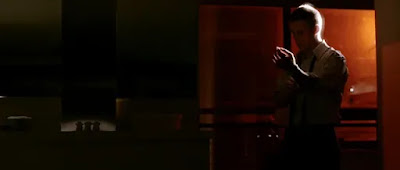Oh no, I haven't ignored Saltburn among the year-end releases. I've just been waiting for Saturday, which is traditionally "Take Out the Trash" Day.
or
The Talented Mr. Rip-Off
"Let me tell you about the very rich. They are different from you and
me. They possess and enjoy early, and it does something to them, makes
them soft where we are hard, and cynical where we are trustful, in a way
that, unless you were born rich, it is very difficult to understand.
They think, deep in their hearts, that they are better than we are
because we had to discover the compensations and refuges of life for
ourselves. Even when they enter deep into our world or sink below us,
they still think that they are better than we are. They are different."
F. Scott Fitzgerald
The observation of the rich is a deep well for writers to exploit, whether they're exploitative or not. Whether it's "Brideshead Revisited" or "The Great Gatsby" those of us with lesser means can always have a good chortle at the eccentricities and excesses of the very well-off (who are so well-off they don't give a rip what you think).
Saltburn, by the very talented Emerald Fennell (she made Promising Young Woman, which I liked) fits right into that category, while also pinging off a couple other sources that would spoil the movie before we even get started spoiling it good and proper.
It follows the adventures of young Oliver Quick (Barry Keoghan—who is becoming dependably reliable for a good performance no matter the movie), freshman at Oxford, who does quite well grade-wise, but is a bit of a dullard, socially. He's on a scholarship. His clothes are cast-offs and second-hand. He's not exciting and not fashionable. Actually a literal outsider, watching the "cool kids" and the "in-crowd" from an envying distance.Until the day comes when preppy Felix Catton (Jacob Elordi) gets a flat in his bicycle tire when he's hurrying to a class. Oliver rolls up and offers young Catton his bicycle to make the time. And Felix is floored by his generosity. And kindness. And takes Oliver "under his wing", as it were. He's taken by Oliver's story about how he grew up in a home of abuse and addiction, and how he got a scholarship by the skin of his teeth in a chance to escape and make a better life for himself. And at the end of the year, Oliver is stunned by the news that his father has died, and Felix, out of kindness and sympathy, invites Oliver to stay the summer at his family's estate, Saltburn, spend time with his family and maybe heal a little. Oliver gratefully accepts. I mean, who wouldn't?
Saltburn being the country estate of Sir James Catton (Richard E. Grant) and Lady Elspeth Catton (Rosamund Pike)—she being a former fashion model and he, well, he's a "sir." Also there are Lady Elspeth's friend, Pamela (Carey Mulligan, all too briefly)—in the credits, she's listed as "Poor Dear Pamela"—Felix's sister Venetia (Alison Oliver) and their American cousin Farleigh (Archie Madekwe)—who doesn't like Oliver and probably never will. Lady Elspeth immediately takes to Oliver and Felix's sister eyes him like he's a veal cutlet.
Saltburn being the country estate of Sir James Catton (Richard E. Grant) and Lady Elspeth Catton (Rosamund Pike)—she being a former fashion model and he, well, he's a "sir." Also there are Lady Elspeth's friend, Pamela (Carey Mulligan, all too briefly)—in the credits, she's listed as "Poor Dear Pamela"—Felix's sister Venetia (Alison Oliver) and their American cousin Farleigh (Archie Madekwe)—who doesn't like Oliver and probably never will. Lady Elspeth immediately takes to Oliver and Felix's sister eyes him like he's a veal cutlet.
And then, the fun begins.
Oliver, who had previously been something of a staid character, begins a campaign of either seducing family members or blackmailing them, whichever will be the most effective to get them on his side or out of the house. You start to wonder if he has an evil twin that took the bus-trip to Saltburn and replaces him, but, no, it's the same guy. He's just written differently, and if, within 15 minutes of his estate arrival you haven't figured out that Oliver is not who he pretends to be, you don't know many sociopaths. Needless to say, once the first change in behavior happens, nothing else should surprise you no matter how extreme.
It must have been awfully fun to write. However, somewhere along the way "structure" was dispensed with and then just tossed as "getting in the way." That would be in the same way that, once the bodies start dropping, a semi-competent medical autopsy would raise red flags and have the bobbies put an end to the movie right then and there with a proper "What's all this, then, eh?" No amount of "let's-put-one-over-on-the-rich" sympathy can obfuscate the "rules don't apply" cherry-picking of the script. Unless it's some political parable, but even then, the sheer blinkerdliness of what's prioritized makes one think that Fennell just wanted to make it easy on herself.One can't fault her, however, for the direction (other than her persistence in lingering on things once the points been made). She gets lovely performances out of everyone—Grant's childishness, Pike's obliviousness, and Elordi manages to sell the worldliness/naivete combination—and Keoghan fully commits to the moment, depending on what moment it is. And her shot choices are lovely with a keen eye towards detail and, at times, brutally close in a way that could betray any mis-steps by an actor. There aren't any.Because the writing of the thing isn't their fault. And it's what keeps Saltburn from being an upper-class melodrama rather than just a pretender.




















































